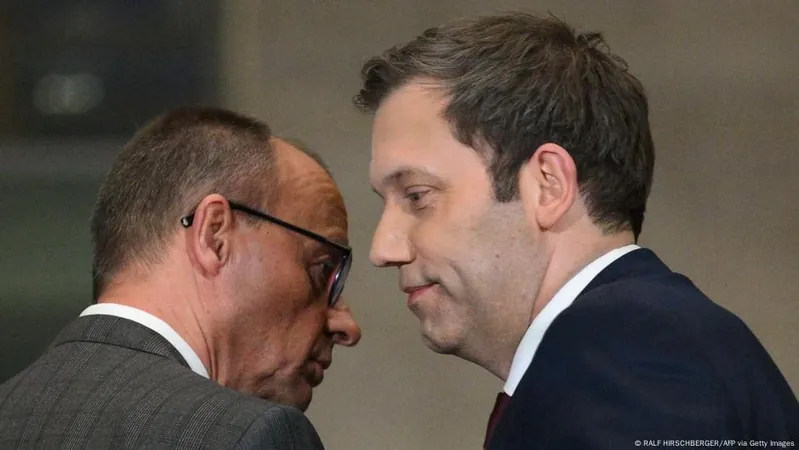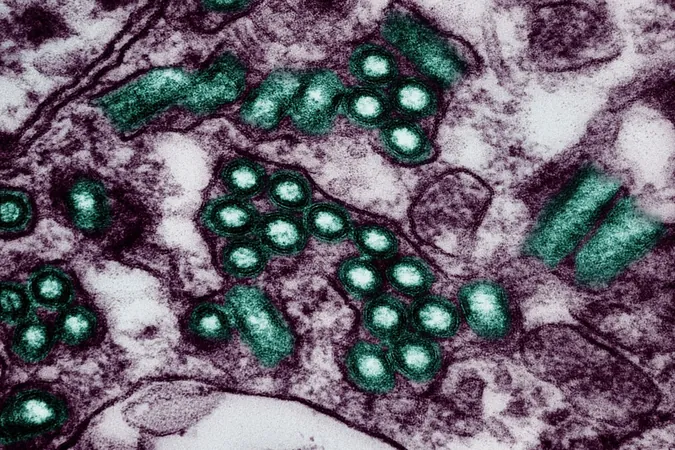
Germany's Coalition Talks Hit Critical Juncture: Will They Succeed by Easter?
2025-03-25
Author: Ling
Germany's political landscape is buzzing as the three major centrist parties have unveiled the initial outcomes of their coalition negotiations following the federal elections that took place in February.
With the Christian Democratic Union (CDU) and its Bavarian sister party, the Christian Social Union (CSU), emerging as the winners, they are now in discussions to form a coalition with the center-left Social Democrats (SPD).
Despite making significant progress, particularly on a groundbreaking debt reform and funding package, tensions have arisen—particularly surrounding migration policies.
CDU leader and expected future Chancellor, Friedrich Merz, has set an ambitious goal to finalize the negotiations by Easter, which falls on April 20 this year.
The urgency behind this timeline is fueled by rising global uncertainties, especially the unpredictability stemming from the Trump administration in the U.S., and the potential impacts on Germany’s already struggling economy.
But can these parties come together in harmony? The stakes are high for Merz, who is feeling the heat from his conservative base. He faces criticism for his support of changing the 'debt brake' to enable increased government spending, a move he initially campaigned against.
Notably, the far-right Alternative for Germany (AfD) party—staunchly opposed to current migration policies—has been courting CDU voters, putting additional pressure on Merz to deliver on his campaign promises.
On the other hand, the SPD holds considerable leverage in these discussions as Merz has explicitly ruled out any alliance with the AfD, narrowing his coalition options exclusively to the SPD.
Migration Policies in the Crosshairs
A focal point of contention remains migration reform. CSU leader Markus Söder, who also serves as the Bavarian State Premier, emphasized the imperative to curb illegal migration, aligning with his party's election promises.
He stated, 'There must be a fundamental change of course: illegal migration must be limited.' Hesse’s State Premier, Boris Rhein, echoed these sentiments, insisting that significant political changes necessitate a reduction of illegal immigration to zero—with measures including border pushbacks and an end to family reunification for migrants.
These voices also urged the SPD to keep their ambitions in check, given that they secured only 16.4% of the federal vote in the elections.
Additionally, former SPD leader Sigmar Gabriel warned against obstructing conservative migration policies, citing that the current SPD strategies had previously driven their base towards the AfD.
Signs of Progress Despite Challenges
Despite these challenges, CDU's Merz highlighted the positive developments within the talks. He noted an improved atmosphere and growing trust among the negotiating parties.
He remains optimistic about reaching an agreement, although many critical details still require resolution.
As exploratory discussions concluded, the parties prepared for a second phase of negotiations, focusing on disagreements about taxation, welfare policy, and migration issues.
For their part, SPD leader Lars Klingbeil characterized the negotiations as 'entirely normal' in their friction, stressing the importance of cooperation for the country's future rather than competition over who secures the most significant wins.
As 16 working groups engage in refining the coalition's specifics, a new schedule for subsequent discussions will be disclosed soon. The clock is ticking, and many are left wondering: Will Germany have a functioning government by Easter? All eyes remain on the negotiation table as the future of Germany hangs in the balance.




 Brasil (PT)
Brasil (PT)
 Canada (EN)
Canada (EN)
 Chile (ES)
Chile (ES)
 Česko (CS)
Česko (CS)
 대한민국 (KO)
대한민국 (KO)
 España (ES)
España (ES)
 France (FR)
France (FR)
 Hong Kong (EN)
Hong Kong (EN)
 Italia (IT)
Italia (IT)
 日本 (JA)
日本 (JA)
 Magyarország (HU)
Magyarország (HU)
 Norge (NO)
Norge (NO)
 Polska (PL)
Polska (PL)
 Schweiz (DE)
Schweiz (DE)
 Singapore (EN)
Singapore (EN)
 Sverige (SV)
Sverige (SV)
 Suomi (FI)
Suomi (FI)
 Türkiye (TR)
Türkiye (TR)
 الإمارات العربية المتحدة (AR)
الإمارات العربية المتحدة (AR)